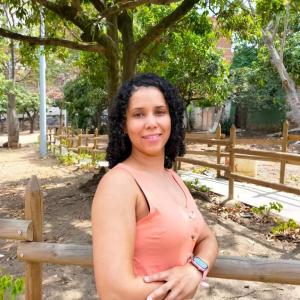Mrs. XIOMARA L
About me
I am Xiomara López Legarda, an Industrial and Environmental Microbiologist, with a Master’s in Biotechnology and a Ph.D., in Pharmaceutical and Food Sciences. I have been a professor and researcher at Universidad de Antioquia (Colombia) for more than 15 years, integrating science, innovation, and education with a strong ethical, social, and environmental focus. My work has centered on projects such as the valorization of agro-industrial residues, the production of bioactive metabolites from edible and medicinal fungi, the degradation of emerging contaminants, and the development of sustainable biotechnological solutions. I am deeply committed to meaningful learning, critical thinking, and mentoring, especially supporting women in research, publication, and leadership. As a member of OWSD–UNESCO and the board of ASCOLMIC, I promote the visibility of women in science and the strengthening of fungal biodiversity knowledge in Colombia. My impact extends beyond academia through publications, conferences, and collaborations with companies to scale bioprocesses, always seeking to reduce gender gaps and demonstrate that knowledge, when shared, becomes a true tool for change.
I am Xiomara López Legarda, an Industrial and Environmental Microbiologist, with a Master’s degree in Biotechnology and a Ph.D. in Pharmaceutical and Food Sciences. I currently serve as a professor and researcher at Universidad de Antioquia (UdeA), my alma mater, where I have developed an academic and professional career of more than 15 years. My passion for science has always been guided by the conviction that transformation begins within ourselves and extends outward through perseverance, ethical responsibility, and a deep commitment to social and environmental impact.
Throughout my career, I have integrated research, teaching, and innovation in a holistic way. My research projects have focused on the valorization of agro-industrial residues, the production of bioactive metabolites from edible and medicinal fungi, the degradation of emerging contaminants, and the development of sustainable biotechnological solutions. These contributions have resulted in scientific articles, book chapters, and presentations at national and international conferences, all of which reflect my dedication to advancing knowledge while addressing real-world challenges.
As an educator, I have taught at the high school, undergraduate, and graduate levels, promoting meaningful learning and critical thinking in the fields of biology, microbiology, and biotechnology. Beyond teaching, I find great fulfillment in mentoring students—especially women—encouraging them to pursue research, publish their work, and develop leadership skills in science. This commitment to equity has led me to actively participate in initiatives such as **Women in Science for the Developing World (OWSD–UNESCO)**, which fosters global connections among women scientists, and to contribute to international outreach projects like *Short Talks, Big Impacts*.
In addition to academia, I have collaborated with entrepreneurs and companies, applying biotechnology in real production settings. My experience in biotechnological food production plants includes scaling up bioprocesses and transferring knowledge from the laboratory to industry, ensuring that science directly benefits society through innovative and sustainable solutions.
I am also a board member of the **Colombian Mycology Association (ASCOLMIC)**, where I work to strengthen awareness and dissemination of the country’s fungal biodiversity. My professional path has been characterized not only by scientific rigor but also by the conviction that leadership in science goes beyond the lab or classroom—it is also expressed in daily actions that inspire change, reduce gender gaps, and promote inclusive, conscious, and socially responsible science.
Ultimately, I see knowledge as a transformative tool: when it is shared, it becomes a collective force for building a more equitable and sustainable world.
